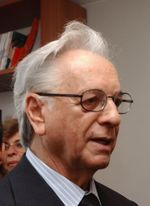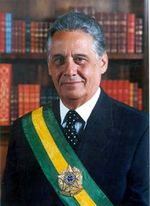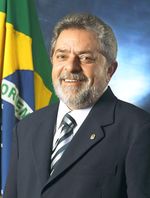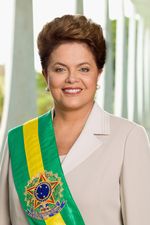تاريخ البرازيل منذ 1985
فترة الجمهورية الجديدة أو تاريخ البرازيل منذ 1985، هي الفترة المعاصرة في تاريخ البرازيل، منذ انتهاء النظام العسكري الذي حكم البلاد منذ عام 1964 حتى 1985 واستعادة الحكومة المدنية.
في يناير 1985، وصلت التفاوض حول عملية التحول نحو الديمقراطية إلى ذروتها بانتخاب تانكردو نڤيس من حزب الحركة الديمقراطية (الحزب الذي عارض دائماً النظام العسكري)، كأول رئيس مدني منذ عام 1964.
كان نڤيس خلفاً للجنرال جواو فيگردو، آخر رئيس عسكري للبرازيل، بمثابة فجر الجمهورية الجديدة (Nova República) ، هذا المصطلح الذي يتناقض مع مصطلح República Velha (أو الجمهورية القديمة، هو اسم أول فترة للجمهورية البرازيلية، استمرت منذ 1889 حتى 1930)، أصبح مرادف للمرحلة المعاصرة من الجمهورية البرازيلية، التي، تأسست مع المؤسسات السياسية في أعقاب إعادة إرساء قواعد الديمقراطية في البلاد.
المرحلة الأولى من الجمهورية البرازيلية الجديدة، منذ تنصيب جوزيه سارني عام 1985 (مرض الرئيس تانكردو نڤيس عشية تتويجه فلم يستطيع الحضور؛ فتوج شريكه الانتخابي جوزيه سارني كنائب للرئيس وظل في هذا المنصب حتى وفاة نڤيس، بدون أن يؤدي قسم المنصب، وخلفه سارني في الرئاسة) حتى وقت تتويج فرناندو كولور عام 1990 الذي يمكن اعتبارها فترة انتقالية، حيث كان دستور 1967-1969 سارياً مانحاً السلطة التنفيذية الكثير من السلطات وكان الرئيس يمكنه التشريع من خلال المراسيم-القوانين.
عام 1986 وفت حكومة سارني بوعدها لتانكردو، بتمرير تعديل في الكونگرس، للدستور الموروث من العهد العسكري، داعياً لانتخابات الجمعية الدستورية الوطنية لوضع مسودة وتأسيس الدستور الجديد للبلاد. بدأت الجمعية الدستورية مداولاتها في فبراير 1987 وانتهت من عملها في 5 أكتوبر 1988.
بتبني الدستوري الحالي في البرازيل عام 1988، اكتملت عملية اعادة تأسيس المؤسسات الديمقراطية. حل الدستور الجديد محل التشريعات الاستبدادية التي كانت قد وُرثت منذ عهد النظام العسكري.
عام 1989 عقدت أول انتخابات رئاسية بالانتخاب الشعبي المبشار منذ الانقلاب العسكري عام 1964، التي عقدت في ظل الدستور الجديد، وانتخب فيها فرناندو كولور. تُوج كولور في 15 مارس 1990. وبتتويج أول رئيس منتخب حسب دستور 1988، كانت آخر خطوة في عملية إعادة الديمقراطية، والمرحلة النهائية للانتقال نحو الديمقراطية.
منذ ذلك الوقت، مرت الفترات الرئاسية الخمسة، دون الخروج عن النظام الدستوري: الفترة الأولى لكولور وفرانكو (كان كولور قد اتهم بقضايا فساد عام 1992 وتنحى عن الحكم، ليخلفه فرانكو، نائبه)؛ الثانية والثالثة برئاسة فرناندو إنريكي كاردوزو. كانت الفترة الرئاسية الرابعة والخامسة برئاسة لولا دا سيلڤا. في 2011، كانت الفترة الرئاسية السادسة بعد اكتمال عملية الانتقال للديمقراطية، والرئيسة الحالية للبرازيل هي ديلما روسف.
. . . . . . . . . . . . . . . . . . . . . . . . . . . . . . . . . . . . . . . . . . . . . . . . . . . . . . . . . . . . . . . . . . . . . . . . . . . . . . . . . . . . . . . . . . . . . . . . . . . . . . . . . . . . . . . . . . . . . . . . . . . . . . . . . . . . . . . . . . . . . . . . . . . . . . . . . . . . . . . . . . . . . . . .
الانتقال نحو الديمقراطية
كان جواو فيگردو آخر حاكم عسكري للبرازيل، قد وقع عفو عام وتحول من نظام ديستينساو في عهد گيزل إلى أبرتورا تدريجي ("افتتح" النظام السياسي)، قائلاً أن هدفه الأول هو "جعل هذه البلاد ديمقراطية".
عملية الانتقال نحو الديمقراطية، التي بلغت ذورتها في نهاية النظام العسكري عام 1985، وأسست الدستور الديمقرطي الجديد عام 1988، كانت مع ذلك مضطربة.
وكان رد فعل المتشديين بإركتاب سلسلة من التفجيرات الارهابية. وكان حادث تفجير أبريل 1981 تأكيد مباشر على تورط العسكر في في الارهاب، لكن فيگردو أثبت أنه ضعيف للغاية في عقاب الجناة.[بحاجة لمصدر] أدى الحادث وتقاعس النظام في تقوية عزيمة الشعب لإنهاء الحكم العسكري. بالإضافة إلى ذلك، واجه فيگردو مشكلات كبيرة، مثل التضخم المتزايد، ضعف الانتاجية، وتنامي الديون الخارجية.
الركود، التضحم، الأزمة
ساهم التحرر السياسي وتراجع الاقتصاد العالمي في المشكلات الاقتصادية والاجتماعية في البرازيل. في عام 1978 و1980، وقعت اضرابات واسعة النطاق في الدائرة الاقتصادية حول ساو پاولو. أكد المتظاهرون أن الزيادة المقرة في الأجور مقابل معدلات التضخم كانت أقل بكثير من مستوى المعيشة الكريمة. وكان زعماء النقابة، بما فيهم المرشحين الثلاثة للرئاسة والرئيس لولا دا سيلڤا قد اعتقلوا لإرتكاب أعمال عنف حسب قوانين الأمن الوطنية. فرض صندوق النقد الدولي برنامج تقشف صارم على البرازيل. تحت هذا البرنامج، كانت البرازيل مطالبة بتخفيض الأجور، لمحاربة التضخم. في الشمال، الشمال الغربي، وحتى في المناطق المزدهرة نسبياً في ريو گراندي دو سول، استحوذ سكان الريف الفقراء على الأراضي الخاصة الغير مستخدمة، ليجبروا الحكومة على تأسيس وزارة جديدة لاستصلاح الأراضي. التوتر بين الكنيسة الكاثوليكية، الصوت الرئيسي المنادي بالتغيير الاجتماعي، وصل إلى ذروته في أوائل الثمانينات بطرد الكهنة الأجانب لتورطهم في قضايا سياسية وقضايا استصلاح الأراضي.
لمواجهة الديون المتنامية، شددت ادارة فيگردو على الصادرات - الغذاء، الموارد الطبيعية، السيارات، الأسلحة، النسيج، الأحذية، وحتى الإلكترونيات - وسمحت للشركات الأجنبية بالتوسع في استكشاف النفط للشركات الأجنبية. على صعيد العلاقات الدولية، كان الهدف هو تأسيس علاقات مع أي دولة يمكنها المساهمة في تنمية الاقتصاد البرازيلي. بقت واشنطن على مسافة محددة، وتوثق حوار الشمال والجنوب.
عام 1983، تعثر الاقتصاد بعد انخفاض ن.م.إ بنسبة 5.0%، مما أدى إلى ارتفاع التضخم وفشل القيادة السياسية. . Figueiredo's heart condition led to bypass surgery in the United States, removing him from control of the situation. In an impressive display, millions of Brazilians took to the streets in all the major cities demanding a direct vote (Diretas Já!) in the choice of the next president. In April 1984, Congress failed to achieve the necessary numbers to give the people their wish, and the choice was left to an electoral college. Figueiredo did not act forcefully to back a preference, so it became a scramble as candidates pursued the collegial votes.
الفترة الانتقالية
In 1984, many public demonstrations were held in major Brazilian cities which made it clear that military rule could not continue. Brazilians started to demand change in the electoral system, aiming to directly elect the President (Diretas Já). As public pressure built up, the opposition Brazilian Democratic Movement Party (Partido do Movimento Democrático Brasileiro, PMDB) proposed a law to implement this change (Emenda Dante de Oliveira). As Congress was controlled by the pro-government Democratic Social Party (PDS, formerly ARENA), the law failed to pass.
Tancredo Neves of Minas Gerais, Getúlio Dornelles Vargas' minister of justice in the 1950s, and former federal deputy, senator, and prime minister seized the momentum. Neves had a reputation of honesty.
His abilities allowed him to build up an alliance between the PMDB and defectors from the (PDS) who founded the Liberal Front Party (PFL). The Democratic Alliance (Aliança Democrática) presented itself as supporting with 1984 demands for political change and end of military rule.
It presented Neves as an opposition candidate against Paulo Maluf.[1] Tancredo Neves was elected by majority vote of the Parliament on January 15, 1985.[2] However, Neves collapsed the night before his inauguration in March, and died on April 21, passing the presidency to Vice President José Sarney (president, 1985–90), long-time supporter of the military regime. The hope that 1985 would provide a quick transition to a new regime faded as Brazilians watched the turn of events in a state of shock. Like the regime changes of 1822, 1889, 1930, 1946, and 1964, the 1985 change also proved to be long and difficult.
Sarney's Government fulfilled Tancredo's promise of passing a constitutional amendment to the Constitution inherited from the military regime so as to summon elections for a National Constituent Assembly, with full powers to draft and enact a new democratic constitution for the country. Ulysses Guimarães, who led the civilian resistance to the military rule, was chosen by his fellow Assembly members to preside over the Constituent Assembly, that was in session from February 1987 until October 1988.
The National Constituent Assembly proclaimed a new constitution in October 1988 and restored civil and public rights such as freedom of speech, independent Public Prosecutors (Ministério Público), economic freedom, direct and free elections and universal health system. It also decentralized government, empowering local and state governments.
As the political transition developed, the economy suffered high inflation and stagnancy.[3] Sarney tried to control inflation with many economic acts, or Plans: Plano Cruzado 1, Plano Cruzado 2, Plano Verão. All of them included government control over prices, price freezes and ultimately changing the national currency. During Sarneys's presidency, Brazil had three currency units: Cruzeiro, Cruzado and Cruzado Novo. Economic domestic troubles led to canceling payments of Brazilian International Debt in 1988. This closed international financial markets for Brazil and the economic situation worsened.
Despite the initial decrease, inflation returned higher than before economic plans, achieving 84% a month at 1990. The government's inability to deal with inflation ultimately led parties that had led the political transition to lose the 1989 elections, the first elections under the new Constitution and the first presidential elections to take place by direct popular ballot since the 1964 military coup.
ادارات كولور وفرناندو
The first direct presidential election after 29 years was held on October 15, 1989 (first round) and November 15, 1989 (second round). Fernando Collor de Mello won the run-off election with 53% of the vote for a five-year term.[4]
Collor's agenda focused on fighting corruption in Sarney's administration and completing the transition from the 21-year military rule to civilian government. Economic changes aimed to control soaring inflation and modernization.
Although he had massive support amongst the voters, the administration had a small parliamentary base as Collor's recently founded party had few deputies and no senators and faced fierce opposition from main parties that splintered from Democratic Alliance: the Brazilian Democratic Movement Party (PMDB), Liberals (PFL), and Social Democrats (Brazilian Social Democracy Party, PSDB).
His first act was known as Plano Collor: all savings accounts and financial investment were frozen, and the national currency was changed from Cruzado Novo to Cruzeiro (NCz$1,000 = Cr$1). Plano Collor had an initial success, but after six months, it failed in its main goal as inflation accelerated again. This started to erode Collor's prestige.

Economic changes included lifting import barriers exposing local companies to international competition. Many companies went bankrupt or were sold, unemployment grew and support for the government deteriorated.
Parliamentary elections were held on October 15, 1990 and the government failed to win a reliable base in Congress and the president started to lose support.
In May 1991, Fernando Collor was accused by his brother, Pedro Collor, of corruption, by condoning an influence peddling scheme run by his campaign treasurer, Paulo César Farias. The Federal Police and Congress began an investigation soon after. Some months later, with the investigation progressing and under fire, Collor went on national television to ask for the people's support, by going out on the street and protesting against "coup" forces. On August 11, 1992, students organized by the National Student Union (União Nacional dos Estudantes – UNE), thousands of students protested on the streets against Collor. Their faces, often painted in a mixture of the colors of the flag and protest-black, lead to them being called "Caras-pintada".[5]
On August 26, 1992, the final congressional inquiry report was released, where it was proven that Fernando Collor had personal expenses paid for by money raised by Paulo César Farias through his influence peddling scheme. Impeachment proceedings were installed in the lower house of congress on September 29, 1992. Collor was impeached, and subsequently removed from office by a vote of 441 for and 38 votes against.[6] Fernando Collor resigned his term in office just before the Brazilian Senate was to vote for his impeachment. The senate did so anyway, suspending his political rights for eight years.[7]
His vice-president, Itamar Franco, assumed the presidency for the remainder of Collor's term.
Franco moved away from Collor and made arrangements for a National Coalition Government including main leaders from PMDB, PFL, and PSDB. Franco appointed Fernando Henrique Cardoso as Minister of Treasury and gave him the responsibility to control inflation – the average annual inflation rate from 1990 to 1995 was 764%.
Cardoso put together a successful stabilization program, Plano Real, that brought inflation to 6% annually. Franco's approval ratings rose and he supported Cardoso to succeed him.
In the October 3, 1994 presidential elections, Fernando Henrique Cardoso, was elected with 54% of the votes.
ادارة كاردوزو

Fernando Henrique Cardoso started his first term on January 1, 1995 and was reelected in 1998. President Cardoso sought to establish the basis for long-term stability and growth and to reduce Brazil's extreme socioeconomic imbalances. His proposals to Congress included constitutional amendments to open the Brazilian economy to greater foreign investment and to implement sweeping reforms – including social security, government administration, and taxation – to reduce excessive public sector spending and improve government efficiency.
His government is credited with providing economic stability to a country marred by years of hyperinflation. At the same time the Mexican, 1997 East Asian, 1998 Russian and 1999–2002 Argentinian economic crises diminished the prospects for economic growth during his presidency.
It was also during his administration that many state-owned companies were privatized, and agencies created for the first time to regulate many sectors of industry (energy, oil, aviation, etc.)
Cardoso's administration also placed a strong focus on external affairs. In addition to acceding to the WTO and participating in the Uruguay Round, Brazil participated in the INTERFET peacekeeping mission to East Timor.
ادارة لولا

عام 2002, Luiz Inácio Lula da Silva, of the PT (Workers' Party), won the presidency with more than 60% of the national vote. In the first months of his mandate, inflation rose perilously, reflecting the markets' uncertainty about the government's monetary policy. However, the markets' confidence in the government was promptly regained as Lula chose to maintain his predecessor policies, meaning the continuation of Central Bank's task of keeping inflation down. Since then, the country underwent considerable economic growth and employment expansion. On the other hand, Lula's mainstream economic policies disappointed his most radical leftist allies, which led to a breakdown in PT (Workers' Party) that resulted in the creation of PSOL.
In 2005, Roberto Jefferson, chairman of the Brazilian Labour Party (PTB), was implicated in a bribery case. As a Parliamentary Commission of Inquiry was set up, Jefferson testified that the MPs were being paid monthly stipends to vote for government-backed legislation. Later, in August of the same year, after further investigation, campaign manager Duda Mendonça admitted that he had used illegal undeclared money to finance the PT electoral victory of 2002. The money in both cases was found to have originated from private sources as well as from the advertising budget of state-owned enterprises headed by political appointees, both laundered through Duda's Mendonça advertising agency. The collection of these incidents was dubbed the Mensalão scandal. On August 24, 2007, the Brazilian Supreme Court (Supremo Tribunal Federal) accepted the indictments of 40 individuals relating to the Mensalão scandal, most which are former or current federal deputies, all of which were or still allies of the Brazilian president.[8]
The loss of support resulting from these scandals was outweighed by the president's popularity among the voters of the lower classes, whose income per capita was raised as a consequence of both higher employment, expansion of domestic credit to consumers and government social welfare programs. The stable and solid economic situation of the country, which Brazil had not experienced in the last 20 years, with fast growth in production both for internal consumers and exportation as well as a soft but noticeable decrease in social inequality, may also partially explain the high popularity of Lula's administration even after several scandals of corruption involving important politicians connected to Lula and to PT. Hence Lula's re-election in 2006: After almost winning in the first round, Lula won the run-off against Geraldo Alckmin of the PSDB (Brazilian Social Democracy Party), by a 20 million vote margin.
Following Lula's second victory, his approval ratings started to rise again (fueled by the continuity of the economical and social achievements obtained during the first term) to a record of 80%, the highest for a Brazilian president since the end of the military regime. The focus of Lula's second term have been to further stimulate the economy by investments in infrastructure and measures to keep expanding the domestic credit to producers, industry, commerce and consumers alike. In 2009, Brazil's economic rise was temporarily halted by a worldwide financial crisis, forcing the government to implement a temporary Tax Relief policy in strategic segments of the economy like automobiles and construction. These measures helped the country to prevent a long term recession and ensured a quick recovery to Brazil's economic ascension.
Another mark of Lula's second term were his efforts to expand Brazil's political influence worldwide, specially after G20 (from which Brazil and other emerging economies participate) replaced the G8 as the main world forum of discussions. Just like his predecessor, he is an active defender of the Reform of the United Nations Security Council, as Brazil is one of the four nations (the others being Germany, India and Japan) officially coveting a permanent seat in the council. Lula is also notorious for seeing himself as a friendly, peacemaker conciliator Head of State. Managing to befriend leaders of rival countries from the likes of Presidents George W. Bush and Barack Obama from the United States to Venezuelan leader Hugo Chavez, Cuban former president Fidel Castro, the President of Bolivia Evo Morales, and lastly, Iranian President Mahmoud Ahmadinejad, fueling protests inside and outside the country due to Ahmadinejad's polemical anti-Semitic statements. Lula took part in a deal with the governments of Turkey and Iran regarding Iran's nuclear program despite the United States' (among other nuclear powers) desire to strengthen the sanctions against the country, fearing the possibility of Iran develop nuclear weapons.
During the Lula administration the Brazilian Army's most important assignment is by being the main force of the United Nations Stabilization Mission in Haiti which have been established to bring aid to the Haitian population, and suffered important casualties during the 2010 Haiti earthquake which claimed hundreds of thousands of lives.
. . . . . . . . . . . . . . . . . . . . . . . . . . . . . . . . . . . . . . . . . . . . . . . . . . . . . . . . . . . . . . . . . . . . . . . . . . . . . . . . . . . . . . . . . . . . . . . . . . . . . . . . . . . . . . . . . . . . . . . . . . . . . . . . . . . . . . . . . . . . . . . . . . . . . . . . . . . . . . . . . . . . . . . .
ادارة روسف

On October 31, 2010, Dilma Rousseff also from the Worker's Party was the first woman elected President of Brazil, with her term beginning in the January 1, 2011. In her winning speech, Rousseff, who was also a key member in Lula's administration, made clear that her mission during her term will be to keep enforcing her predecessor's policies to mitigate poverty and ensure Brazil's current economic growth.
Challenges faced during Rousseff's term include managing the infraestruture projects to increase the country's economic activity with special attention to the 12 cities set to host the upcoming 2014 FIFA World Cup to be held in Brazil (Rio de Janeiro being a special case as it will also hold the 2016 Summer Olympics), and taking cautionary measures to protect the Brazilian economy in face of the ongoing economic crises in Europe and the United States, which also contributed to reduce the national GDP growth during the first half of her term, in comparison to his predecessor's tenure.
On June 2011, Rouseff announced a program labelled "Brasil Sem Miséria" (Brazil Without Poverty). With the ambitious task of drastically reducing absolute poverty in Brazil until the end of her term, which currently afflicts 16 million people in the country or a little less than a tenth of the population. The program involves broadening the reach of the Bolsa Família social welfare program while creating new job opportunities and establishing professional certification programmes. In 2012, another program labeled "Brasil Carinhoso" (Tenderful Brazil) was launched with the objective to provide extra care to all children in the country who live below the poverty threshold.
Although there are several criticism from the local and international press regarding the lower-than-expected economic results achieved during her first two years ahead of the government and the measures taken to solve it, Rouseff's approval rates reached levels higher than any other president since the end of the military regime and discussions regarding the campaign for a second term in 2014 are underway.
المصادر
- ^ Waisman, Carlos Horacio (2005). Spanish and Latin American Transitions to Democracy. p. 173.
- ^ Freire, Paulo (1996). Letters to Cristina. p. 251.
{{cite book}}: Unknown parameter|coauthor=ignored (|author=suggested) (help) - ^ The Hyperinflation in Brazil, 1980–1994
- ^ Solingen, Etel (1998). Regional Orders at Century's Dawn. p. 147.
- ^ Rezende, Tatiana Matos UNE 70 Anos: "Fora Collor: o grito da juventude cara-pintada" União Nacional dos Estudantes. Retrieved August 17, 2007.
- ^ Lattman-Weltman, Fernando. September 29, 1992: Collor's Impeachment(البرتغالية) Fundação Getúlio Vargas. Retrieved August 17, 2007.
- ^ Sérgio Campos Gonçalves, Collorgate: mídia, jornalismo e sociedade nos casos Watergate e Collor, (Rio de Janeiro: CBJE, 2008). ISBN 9788578101626.
- ^ Folha Online: STF opens criminal action


